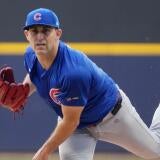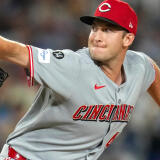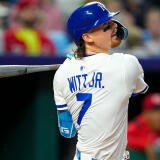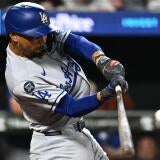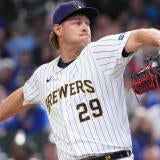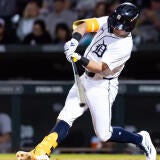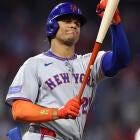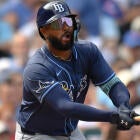By the Numbers: Cornering the market
There are more than a few disappointing players at both third base and first base this season, changing the corner infield landscape. Our Al Melchior takes a closer look.
In my recent "Catcher-22" column, I discovered that the market for catchers looks very different now than it did back in March. The unexpected emergence of several players, including Dioner Navarro, Ryan Doumit, Bengie Molina and Rod Barajas, has increased the supply of quality catchers far beyond Martin, McCann, and Find Another Plan. Not all of these surprise performances will last all year, but several of the younger crop, like Navarro and Doumit, look like they are for real.
In the second installment of this series on position scarcity, we move on to the infield corners to see if the supply of quality players has followed our expectations. The market for first basemen is typically the opposite of the catcher market, with a wide range of high-scoring Fantasy options. The third baseman market usually falls somewhere in between these two extremes. Has the rapid arrival of up-and-coming stars dampened the value of established stars at these positions? Or have disappointing performances by those expected to be in the top tier increased the worth of the top performers? And how have the markets for second- and third-tier players been affected?
To get an overview of these markets, I have ranked the regular players at each position by RC/27, a per-game measure that encompasses a variety of offensive events. Then I made a few adjustments to the rankings based on sample size (e.g., Chase Headley, Russell Branyan) and track record (e.g., Ryan Howard, Ryan Zimmerman, Russell Branyan again). For each position, players have been placed into four categories: The Elite, The Stars, The Bubble Guys and The Duds. Bear in mind that there is a mixed-league bias to these labels, and that many of The Duds are defensible choices for AL- or NL-only leagues, albeit of the last resort variety.
All data presented below is for the season to date through Friday, June 20.
First Basemen
The Elite: From a skills and performance perspective, no one is playing in the same league as Lance Berkman and Albert Pujols. Adrian Gonzalez and Justin Morneau could arguably be counted among The Elite due to their RBI totals, but neither has shown the power/contact combination that Berkman and Pujols have. With Pujols set to return in early July, these two will find themselves in a class by themselves at the season's end.
| Player | Walk Rate | Whiff Rate | Iso Power | H/BIP | Runs Created | RC/27 |
| Lance Berkman | 13% | 16% | 0.337 | 37% | 85 | 12.9 |
| Albert Pujols | 19% | 10% | 0.284 | 33% | 69 | 12.3 |
The Stars: Some of the players expected to be among the elite have been a cut below this year. The Isolated Power averages of Ryan Howard, Prince Fielder, Justin Morneau and Mark Teixeira have all dropped significantly from last year. Howard's drop in production has been the most surprising. His batting average, which has lingered in the low .200s, is partially the product of an inexplicably low 27 percent H/BIP rate. The market for elite-level first basemen looks sparse right now, but there is a "buy low" opportunity to get Howard or some of the other underachieving first basemen right now, as their odds of rebounding in the second half look good.
| Player | Walk Rate | Whiff Rate | Iso Power | H/BIP | Runs Created | RC/27 |
| Jason Giambi | 15% | 19% | 0.308 | 23% | 46 | 8.0 |
| Conor Jackson | 12% | 9% | 0.188 | 31% | 44 | 7.2 |
| Kevin Youkilis | 9% | 19% | 0.220 | 34% | 49 | 7.1 |
| Adrian Gonzalez | 9% | 22% | 0.260 | 32% | 56 | 6.8 |
| Prince Fielder | 13% | 19% | 0.217 | 31% | 51 | 6.8 |
| Nick Johnson | 23% | 23% | 0.211 | 24% | 22 | 6.7 |
| Justin Morneau | 8% | 16% | 0.181 | 34% | 48 | 6.2 |
| Derrek Lee | 9% | 17% | 0.221 | 31% | 49 | 5.7 |
| Ryan Howard | 13% | 37% | 0.262 | 27% | 43 | 5.2 |
| Mark Teixeira | 12% | 18% | 0.166 | 29% | 41 | 5.1 |
The Bubble Guys: These are the middle-of-the-pack first basemen who could usually be found on waivers in 10 percent or more of the mixed leagues on CBSSports.com. If you were looking for a fill-in for Albert Pujols, Nick Johnson or Paul Konerko, the best options available were probably among the players on this list. What is interesting about this group is how low they have set the standard for replaceability. The median RC/27 level for 1B, according to my preseason projections, was supposed to be 6.4, but in actuality it is only 5.2. That makes James Loney our official pick at 1B for Mr. Bubble. If the median RC/27 were a run or so higher, as it normally would be, you could automatically scan the list free agent first basemen to fill a hole at your utility position. However, with the average 1B producing at such a low level, you are probably better off looking among the outfielders and designated hitters first.
| Player | Walk Rate | Whiff Rate | Iso Power | H/BIP | Runs Created | RC/27 |
| Joey Votto | 9% | 20% | 0.214 | 31% | 41 | 6.2 |
| Todd Helton | 17% | 15% | 0.129 | 30% | 44 | 6.0 |
| Casey Kotchman | 6% | 6% | 0.142 | 30% | 38 | 5.6 |
| James Loney | 9% | 14% | 0.157 | 34% | 40 | 5.2 |
| Carlos Pena | 12% | 34% | 0.203 | 29% | 31 | 5.1 |
| Kevin Millar | 12% | 16% | 0.166 | 26% | 37 | 4.9 |
The Duds: All of the players below should be avoided in mixed leagues, with the possible exception of Konerko. It may be some time before he is activated from the DL, but if -- and only if -- he shows signs of hitting with his usual power, he could be a decent pickup. My preseason projection of a 7.7 RC/27 looks wildly optimistic now.
| Player | Walk Rate | Whiff Rate | Iso Power | H/BIP | Runs Created | RC/27 |
| Lyle Overbay | 15% | 22% | 0.142 | 32% | 34 | 4.7 |
| Mike Jacobs | 5% | 26% | 0.295 | 24% | 30 | 4.7 |
| Ryan Garko | 9% | 16% | 0.117 | 28% | 31 | 4.7 |
| Carlos Delgado | 10% | 23% | 0.179 | 27% | 35 | 4.7 |
| John Bowker | 5% | 22% | 0.184 | 30% | 23 | 4.6 |
| Paul Konerko | 13% | 19% | 0.154 | 23% | 27 | 3.9 |
| Daric Barton | 14% | 27% | 0.105 | 30% | 26 | 3.8 |
| Adam LaRoche | 10% | 26% | 0.142 | 27% | 26 | 3.5 |
| Richie Sexson | 10% | 33% | 0.159 | 28% | 22 | 3.5 |
| Ross Gload | 4% | 11% | 0.032 | 26% | 9 | 2.0 |
Third Basemen
The Elite: As with the first basemen, you would think this would be a larger group. David Wright, Miguel Cabrera and Ryan Braun are conspicuously absent. In Cabrera's case, a decrease in power is the problem, and Braun is getting cheated with a 31 percent H/BIP that should be four or five percentage points higher. Both Isolated Power and H/BIP are off for Wright. There are the usual questions about Cabrera's conditioning, but at minimum, Wright and Braun should have a better second half. As A-Rod and Chipper garner all of the attention, this presents an opportunity to get either of them, or possibly Cabrera, at a discount.
| Player | Walk Rate | Whiff Rate | Iso Power | H/BIP | Runs Created | RC/27 |
| Chipper Jones | 16% | 12% | 0.239 | 40% | 77 | 12.7 |
| Alex Rodriguez | 11% | 21% | 0.290 | 37% | 54 | 10.4 |
The Stars: The second tier of third basemen has grown, not only because of the dropoffs experienced by Wright, Braun and Cabrera, but the addition of rookies Evan Longoria and Chase Headley. You can also add Ramon Vazquez, Jorge Cantu and Mark Reynolds to the ranks of productive third basemen. Each has improved his overall skill set to the point where any of the trio can be considered a solid pick for a mixed league roster. Back in March, Reynolds was the only one of this group who could have even been considered as a borderline roster candidate. While Vazquez belongs in this tier, keep in mind that his .330ish batting average has been inflated by a 37 percent H/BIP, and that his true place on this RC/27 ranking is somewhere in the Chone Figgins/Jorge Cantu neighborhood. That's still a pretty nice place to live. The bounty of these productive third basemen is good news for owners, because they will probably come more cheaply now than earlier in the season, when they seemed to be more scarce.
| Player | Walk Rate | Whiff Rate | Iso Power | H/BIP | Runs Created | RC/27 |
| Chase Headley | 0% | 37% | 0.438 | 50% | 5 | 13.0 |
| Aramis Ramirez | 13% | 18% | 0.212 | 32% | 54 | 7.8 |
| Ramon Vazquez | 11% | 19% | 0.186 | 37% | 31 | 7.4 |
| Ryan Braun | 5% | 21% | 0.285 | 31% | 54 | 6.6 |
| Carlos Guillen | 11% | 14% | 0.159 | 33% | 43 | 6.3 |
| Joe Crede | 9% | 14% | 0.253 | 27% | 41 | 6.2 |
| Mark Reynolds | 11% | 36% | 0.251 | 33% | 44 | 6.2 |
| David Wright | 13% | 18% | 0.199 | 30% | 50 | 6.0 |
| Miguel Cabrera | 10% | 20% | 0.182 | 32% | 44 | 5.8 |
| Chone Figgins | 16% | 22% | 0.046 | 38% | 25 | 5.8 |
| Jorge Cantu | 7% | 19% | 0.211 | 31% | 45 | 5.6 |
| Evan Longoria | 11% | 27% | 0.224 | 30% | 36 | 5.5 |
| Garrett Atkins | 4% | 13% | 0.162 | 33% | 40 | 5.1 |
The Bubble Guys: In his first 22 games this year, Russell Branyan is putting up A-Rod stats, but his track record suggests something much more modest in store for the long haul. Despite his career .231 average, Branyan has enough power to be a legitimate bubble candidate. Ryan Zimmerman's production and Eric Chavez's playing time have been hampered by injuries, thus making them surprising entries on the bubble list. With their current numbers, both actually look more like "Duds" than like "Bubble Guys." However, with more ABs, they should be producing at a level similar to Mr. Bubble himself, Casey Blake. It is still not known when Zimmerman will return from his shoulder injury, but with Chavez, Blake, Ty Wigginton and the surprising Rich Aurilia (.290 average and 23 RBI in 186 AB) all available in a majority of leagues, it is unnecessary to burn a reserve slot on him if you have a better use for it.
| Player | Walk Rate | Whiff Rate | Iso Power | H/BIP | Runs Created | RC/27 |
| Russell Branyan | 14% | 38% | 0.530 | 32% | 23 | 13.0 |
| Rich Aurilia | 10% | 12% | 0.137 | 31% | 28 | 5.8 |
| Ty Wigginton | 10% | 18% | 0.154 | 30% | 23 | 5.6 |
| Troy Glaus | 14% | 18% | 0.181 | 29% | 41 | 5.6 |
| Casey Blake | 8% | 20% | 0.171 | 31% | 35 | 5.5 |
| Mike Lowell | 8% | 14% | 0.222 | 28% | 33 | 5.5 |
| Scott Rolen | 10% | 16% | 0.148 | 31% | 28 | 5.3 |
| Edwin Encarnacion | 10% | 19% | 0.210 | 26% | 37 | 5.1 |
| Blake DeWitt | 9% | 17% | 0.126 | 31% | 30 | 5.1 |
| Eric Chavez | 5% | 20% | 0.171 | 33% | 10 | 5.0 |
| Ronnie Belliard | 14% | 22% | 0.202 | 26% | 15 | 4.9 |
| Adrian Beltre | 10% | 19% | 0.199 | 25% | 39 | 4.9 |
| Alex Gordon | 9% | 24% | 0.150 | 33% | 39 | 4.9 |
| Ryan Zimmerman | 4% | 18% | 0.170 | 28% | 25 | 4.2 |
The Duds: For owners who picked up Pedro Feliz during his hot May, when he batted .311, it's time to revisit your options. He has settled into his usual pedestrian performance and skill indicator levels. At least he is predictable: it's June, so there must be a comic book flick at the multiplex and Feliz must be batting in the .250s. If you have run out of other options, and you are looking for a potential bargain third baseman from this group, try Melvin Mora. He is hitting for power and contact, but his average is down in the .240s because of a 25 percent H/BIP. This rate is far below his norm, despite a decreasing flyball rate that, along with his power numbers, would suggest a higher H/BIP is in order. If luck evens out for Mora, his batting average should return to its usual level in the .270s.
| Player | Walk Rate | Whiff Rate | Iso Power | H/BIP | Runs Created | RC/27 |
| Kevin Kouzmanoff | 4% | 22% | 0.158 | 31% | 36 | 4.4 |
| Jack Hannahan | 14% | 29% | 0.113 | 30% | 25 | 4.3 |
| Jose Bautista | 9% | 25% | 0.158 | 31% | 27 | 4.2 |
| Pedro Feliz | 7% | 10% | 0.154 | 26% | 29 | 4.1 |
| Jose Castillo | 7% | 18% | 0.161 | 30% | 29 | 3.8 |
| Melvin Mora | 7% | 15% | 0.172 | 25% | 29 | 3.7 |
| Bill Hall | 8% | 28% | 0.172 | 26% | 22 | 3.3 |
| Mike Lamb | 6% | 14% | 0.078 | 26% | 16 | 2.6 |
To recap, this review of the market for corner infielders shows that both positions have been plagued by disappointing performances from several players who were expected to be elite superstars. This means that the trade price for a solid, but unspectacular, corner infielder should be dropping. The downgrading of production has been especially apparent for first basemen. In terms of RC/27, the median first baseman has actually been less productive (5.2) than the median third baseman (5.5). There are also more third basemen than first basemen producing at a high level on a per-game basis, so third base (in addition to outfield and designated hitter) is a better source for finding players to fill an open utility slot.
|
|
|
Runs Created per 27 Outs (RC/27) -- An estimate of how many
runs a lineup would produce per 27 outs if a particular player
occupied each spot in the order; ex. the RC/27 for Miguel Cabrera
would predict the productivity of a lineup where Cabrera (or his
statistical equal) batted in all nine spots; created by Bill James Component ERA (ERC) -- An estimate of a what a pitcher's ERA would be if it were based solely on actual pitching performance; created by Bill James Base Hits per Balls in Play (H/BIP) -- The percentage of balls in play (at bats minus strikeouts and home runs) that are base hits; research by Voros McCracken and others has established that this rate is largely random and has a norm of approximately 30% Isolated Power -- The difference between slugging percentage and batting average; created by Branch Rickey and Allan Roth Walk Rate -- Walks / (at bats + walks) Whiff Rate -- Strikeouts / at bats |
Al Melchior was recently a Fantasy columnist and data analyst for Baseball HQ and will be providing advice columns for CBSSports.com. Click here to send him a question. Please put "Melchior" in the subject field.

